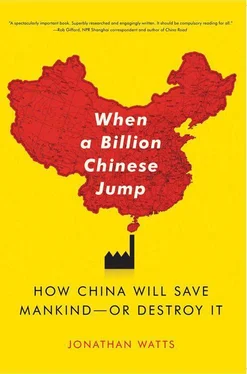Outside of wartime, leaders in all political systems struggle to rein back demand. Efforts to trim excess often prove temporary, ineffective, or politically suicidal. Supporters of slower growth or more concern for the environment are often marginalized or defeated. As noted in earlier chapters, this was true two thousand years ago of Liu An, the Taoist naturalist who is thought to have compiled the Book of the Prince of Huainan. Modern Chinese history contains similar examples. 71
The most prominent was Liu Shaoqi, the former president of China who was purged during the Cultural Revolution. Among his supposed crimes was paxingzhuyi or “reptilianism,” a reference to his cautious, gradualist approach to development. While Mao demanded grand plans and immediate results, Liu held up a project to dam Dianchi Lake, and in 1961, expressed alarm at the scale of logging in Heilongjiang, saying, “How can we face future generations if we clear-cut all these wonderful Korean pines? We should leave some trees for them.” 72Those words sound inspired today. But future generations never had a chance to thank Liu. In 1968, he was condemned as “China’s number one Capitalist Roader” and died in prison a year later.
That murderous age is over, but for the environment the situation has become worse as the power of consumers has grown. After Mao, each successive generation of leaders had less authority than their predecessors. Hu and Wen do not rule by charisma and fear, but by pulling together coalitions within the politburo. Local governments have more autonomy than ever. Industries operate with minimal oversight. The media, the courts, and the electorate are too weak to hold them to account.
As a result, while there is no Mao at the pinnacle of politics in China today, there are hundreds or thousands of little Maos in local government and industry, each with a personal fiefdom, each trying to build an empire, and each desperate to make their mark with a big project. They appreciate the central government’s attempt to restrain them as much as Mao liked being lectured by foreign powers. China’s political system now exhibits the worst elements of dictatorship and democracy: power lies neither at the top nor the bottom, but within a middle class of developers, polluters, and local officials who are difficult to regulate, monitor, and challenge.
The Ministry of Environmental Protection is too weak to act as a counterbalance. Even after securing full voting status in the cabinet it lacked the clout and resources of other government bodies. 73Control over 11,000 lower-level environmental bureaus is patchy at best and in many cases nonexistent. 74Only a tenth of China’s environmental laws are enforced, according to one legal expert. 75Only half the funds dedicated to environmental protection are actually spent on legitimate projects. 76Data that might strengthen the ministry’s authority are withheld. 77Most conservation programs are not under its control. Instead, reserves are usually run by the State Forestry Administration, which favors rare-animal breeding farms, and by local authorities, which often want to use the land for business.
Gradually Pan Yue, the ministry’s most visible driving force and one of its main theorists, 78has been sidelined. 79In 2006, the “green GDP” programs he established were quietly shelved. A year later, he told friends he had to lie low for a while after being pointedly passed over for promotion during the Seventeenth Communist Party Congress. In 2008, he was stripped of both his powers to enforce environmental assessment impact regulations and his role as a ministry spokesman. 80The pollution disclosure laws he initiated are now ignored by most local governments. 81
There are other advocates of change. China’s leaders have long been aware of the dangers of waste, inefficiency, and environmental degradation. Government officials constantly talk about policy turning points and new directions. In the 1990s, Premier Zhu Rongji tried to make environmental protection more of a priority. 82His successor, Wen Jiabao, went considerably further and is widely credited among environmental activists for pushing a green agenda, but he lacks a strong power base compared with other politburo members. His place is likely to be taken by Li Keqiang, who is being handed many of the portfolios relating to the environment and climate change. But authority is diffused. Unable to claim either an imperial mandate from heaven above or a popular mandate from the people below, China’s leaders often follow rather than guide development. Laudable laws and praiseworthy policies are not enough. If conservation is to stand any chance of working in China, the government needs to be either a lot more dictatorial or a lot more democratic or, more realistically, needs to secure the support of the market, the media, and a nascent civil society centered around NGOs and the Internet. Without them, the authorities have the power to expand but not the power to conserve. Waste and environmental destruction are inevitable. 83The emphasis on efficiency of “Scientific Development” reads just like any other propaganda slogan painted on a village wall: it highlights the fact that reality is the complete opposite.
Even Ma Zhong, the pioneer of Heilongjiang’s first wetland nature reserve, is fighting a losing battle. 84Despite international and central government support, his efforts to make the Sanjiang area an example of conservation management failed to win widespread support among locals who preferred to put their land to greater economic use. Demand for food and land is still growing. As farming becomes increasingly profitable, people move in and the government’s commitment to the environment is compromised yet further. The population of the three provinces that once encompassed the Great Northern Wilderness is now well above 100 million. The region is a bastion of the state’s food security policy. Wetlands and wildlife don’t really stand a chance. 85
“This is the most difficult time to be a conservationist,” Ma said sadly. “Few people agree with me. Although it’s nice in principle, when people are given the choice of food on the table or the protection of birds, they all choose food. That is understandable.”
New cold-resistant hybrids, modern technology, and global warming had turned the Sanjiang area into the rice capital of China. The marshes that Ma helped to convert into dry land for farming during the Cultural Revolution were being reflooded and turned into rice paddies. Nature reserve managers approved the massive expansion of the cultivated land on the dubious grounds that paddy fields are a form of wetland. 86Far from blocking this expansion into what little was left of the wilderness, the government has encouraged land conversion with tax incentives and price subsidies. 87Heilongjiang has become the biggest grain producer in China, with a surplus so great that much of it is turned into ethanol. 88
“In the space of just two or three years, farming on the Sanjiang Plain has become profitable for the first time in more than fifty years,” said Ma. “Wetland conservation cannot compete.” The math is simple. The value of wetland rises more than thirtyfold once it is converted into farmland.
Yet Heilongjiang’s best soil is being degraded. The province once boasted the most carbon-rich earth in China. The black soil was so valuable that it was protected. Under provincial regulations, townships were not supposed to build factories unless they first removed the loam and laid it down elsewhere. But this rule was usually ignored. The topsoil has thinned and paled as a result of overcultivation and excess use of fertilizer. In some areas in the southwest of the province, the land is suffering the same fate as much of Gansu, Ningxia, and Inner Mongolia and turning into desert. Local journalists told me this was now a bigger problem for the province than water pollution.
Читать дальше










